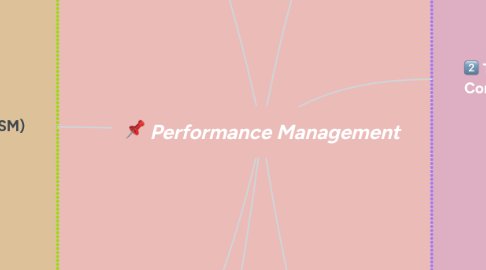
1. Disadvantages of Poorly Implemented PM Systems
1.1. For Employees
1.1.1. Lowered Self-Esteem
1.1.2. Employee burnout & job dissatisfaction
1.1.3. Damaged Relationship
1.1.4. Use of False/Misleading Info
1.2. For Managers
1.2.1. Increased Turnover
1.2.2. Decreased Motivation to Perform
1.2.3. Unjustified Demands on Managers Resources
1.2.4. Varying & Unfair Standards & ratings
1.3. For Organizations
1.3.1. Wasted Time & Money
1.3.2. Unclear Ratings System
1.3.3. Emerging Biases
1.3.4. Increased Risk of Litigation
2. Definition of Reward System (SM)
2.1. Set of Mechanisms for Distributing Tangible Returns
2.1.1. Cash Compensation
2.1.1.1. Base Pay
2.1.1.2. Cost-Of-Living & Contingent Pay
2.1.1.3. Incentives
2.1.2. Benefits
2.1.2.1. Income Protection
2.1.2.2. Allowances
2.1.2.3. Work/life Focus
2.2. Set of Mechanisms for Distributing Intangible or relational returns
2.2.1. Recognition & Status
2.2.2. Employment
2.2.3. Challenging Work
2.2.4. Learning Opportunities
3. Aims & Role of PM Systems
3.1. Role
3.1.1. Returns with Low Dependency on the PM System
3.1.2. Returns with Moderate Dependency on the PM System
3.1.3. Returns with High Dependency on the PM System
3.2. Aims/Purpose
3.2.1. Strategic
3.2.2. Administrative
3.2.3. Informational
3.2.4. Developmental
3.2.5. Organizational Maintenance
3.2.6. Documentational
4. Integration with Other Human Resources and Development Activities
4.1. Development of Training to Meet Organizational Needs
4.2. Recruitment & Hiring Decisions
4.3. Workforce Planning
4.4. Development of Compensation Systems
5. Definition of PM
5.1. Continous process of Identifying
5.2. Continous Process of Measuring
5.3. Continous Process of Developing
6. Characteristics of An Ideal PM System
6.1. Congruent with Organizational Strategy
6.2. Thorough
6.3. Practical
6.4. Meaningful
6.5. Specific
6.6. Acceptable & fair
6.7. Identifies Effective/Ineffective Performance
6.8. Reliable
6.9. Valid
6.10. Inclusive
6.11. Open ( No Secrets )
6.12. Correctable
6.13. Standardized
6.14. Ethical
7. The Performance Management Contribution
7.1. For Employees
7.1.1. Clarify Definitions of Job & Success Criteria
7.1.2. Increase Motivation to Perform
7.1.3. Increase Self-Esteem
7.1.4. Enhance Self-Insight and Development
7.2. For Managers
7.2.1. Communicate Supervisors' view of performance more clearly
7.2.2. Managers Gain Insight about Subordinates
7.2.3. Better & more Timely Differentiation Between good & poor Performances
7.2.4. Employees become more competent
7.3. For Organization/HR Function
7.3.1. Clarify Organizational Goals
7.3.2. Facilitate Organizational Change
7.3.3. Fairer, more Appropriate Administrative Actions
7.3.4. Better Protection from Lawsuits

